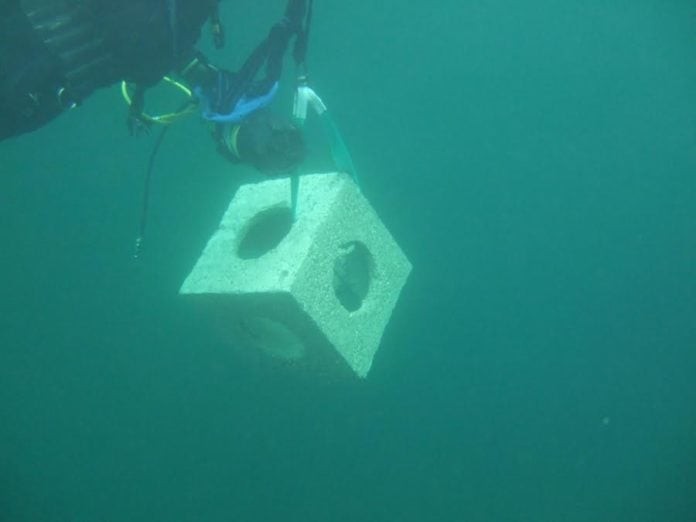A small company in the U.K. wants to help protect that country’s indigenous white-clawed freshwater crayfish population from extinction.
ARC Marine is constructing a custom-built reef structure at Vobster Quay, an inland water site and former quarry, near Radstock, Somerset.
The Torbay-based company will design and build artificial reefs that can block illegal fishing trawlers, provide a protective marine habitat for endangered and declining species, boost the stocks of overfished species and protect coastlines and underwater habitats from erosion.
ARC Marine is paying for its world-first operation through a crowdfunding campaign, and chose the reef’s site due to its close proximity to Bristol Zoo, with whom they are collaborating to regenerate dwindling numbers of the globally-protected crayfish species.
Due to habitat destruction and the introduction of an aggressive and invasive U.S. breed, the white-clawed freshwater crayfish is at risk of becoming extinct in the U.K. within 20-30 years.
Dr. Nicholas Higgs, Deputy Director of the Marine Institute at the University of Plymouth’s COAST lab facility, says:
“Artificial reefs can be very useful in enhancing marine life, but also double up as anti-trawling devices.
“Firstly, they provide structure by concentrating fish and nutrients around the reef, creating a whole ecosystem. They also prevent fishing in that area as these big structures stop ships towing fishing and trawling gear through the area.
“The ARC modules provide increased habitat complexity. By providing that living space, you should be able to increase the amount of crayfish that can live in habits like quarries and man-made water bodies.”

According to the World Wildlife Fund, only 4 percent of the world’s oceans are officially protected. A study published in the journal Nature found that 93 per cent of carbon dioxide is stored in algae, undersea vegetation and coral, highlighting the need to prevent marine degradation in order to protect the earth’s atmosphere.
Overfishing is also an environmental problem in both the UK and abroad. 53 per cent of the world’s fisheries are fully exploited, and 32 per cent are over exploited, depleted, or recovering from depletion, according to WWF.
At this current rate, research from scientists and ecologists shows that all species currently fished for food are predicted to collapse by 2048.
ARC Marine co-founder Tom Birbeck is confident that the company can be a U.K. leader in reversing this trend by setting an example with its own ocean conservation efforts. His decision to choose crowdfunding over commercial sales or grant funding aims to reflect the nature of the problem his company is trying to solve:
“Oceans and waterways belong to everyone. So, the responsibility of marine conservation, and the challenge of reversing ocean degradation, is one that we all must collectively tackle.
“We hope that at the end of this campaign people will see what we see. Not just the critical condition of the world’s oceans, but a viable solution to the problems shown here.
“We’re giving the crowd the power to rebuild and protect our delicate marine environment for generations to come with a 500+ year project lifespan. There is no pledge like it in the history of crowdfunding.”
For more information about the crowdfunding campaign go to crowdfunder.co.uk.

